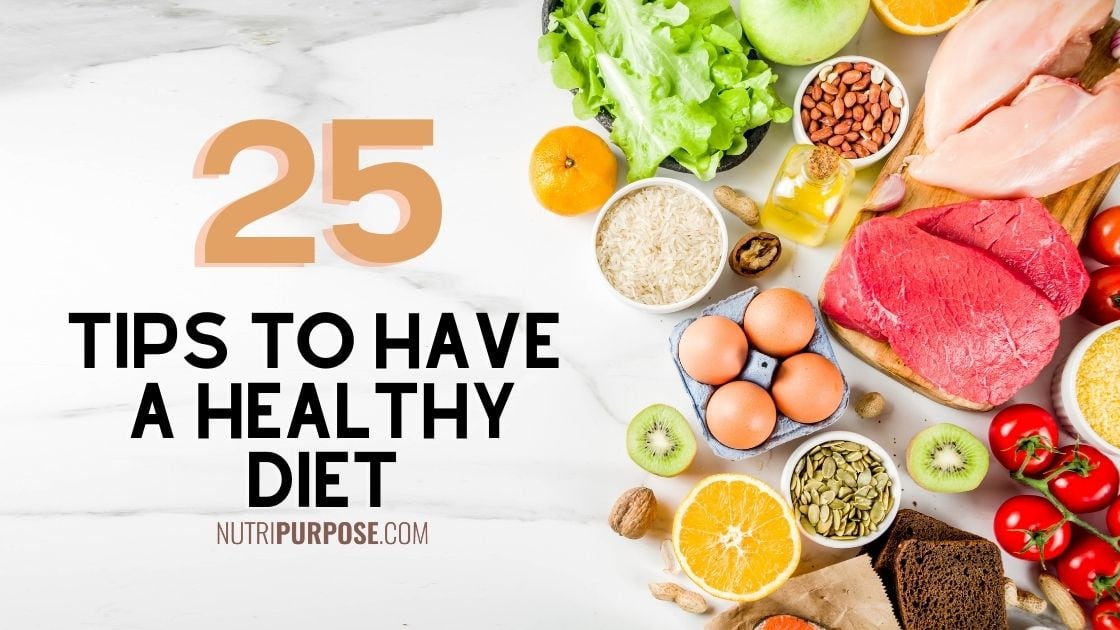- Opt for whole-grain bread instead of refined grain for a healthier and low-calorie diet
- Eat slowly to feel fuller faster and aid digestion
- Make a grocery list and avoid shopping while hungry to purchase healthier foods
- Incorporate Greek yogurt into your diet for a low-carb and protein-rich option
- Increase protein intake to maintain muscle mass and improve satiety
Do you want to start eating a healthy diet and change your lifestyle?
That is the goal of many people today. That’s why we want to help you.
Many times it is not at all easy to have a balanced diet and a healthy lifestyle. Especially because of the daily work rhythm and all the responsibilities we have.
But if we put in a little bit of our part we can achieve it.
We must prioritize our health and well-being, as Bethenny Frankel says:
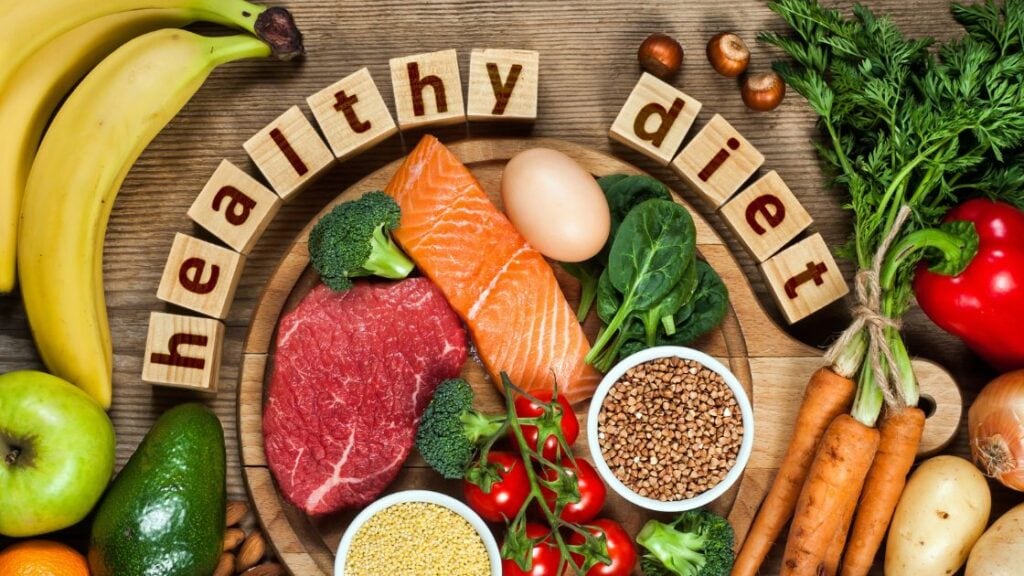
Your diet is a bank account. Good food choices are good investments.
Keep reading and learn with us some healthy diet tips.
Top 25 Simple Tips To Follow A Healthy Diet
1. Opt for whole-grain bread rather than refined grain
Whole wheat bread contains fiber, manganese, B vitamins, and minerals like zinc, magnesium, and iron.
Refined bread, like white bread, has a very poor nutritional value and is related to multiple diseases.
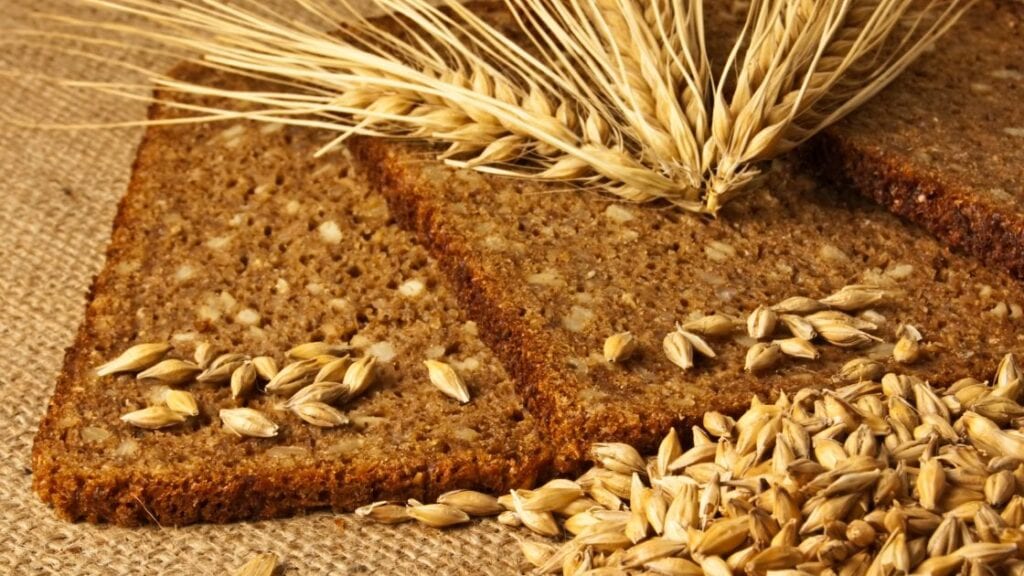
If you want to have a healthy and low-calorie diet, always prefer whole wheat bread instead of white bread.
2. Go more slowly
Eat slowly, no one is rushing you.
The faster you eat, the more likely you are to eat large amounts of food.
If you eat slowly, you will fill up faster.
Also, you will help your digestive system to digest the food, and you will enjoy the food better.
The brain takes time to know if you are already full. This takes approximately 20 minutes.
So, give your brain time to assimilate the food.
3. Bring a list with you while you shop
When you go grocery shopping, you should use these crucial tactics:
- Don’t shop while you’re hungry
- Make a plan and list your needs in advance
By doing this, you’ll purchase healthy goods to have around the house.
Impulsive purchases can happen when you don’t know exactly what you need.
Hunger can lead you to add even more low-nutrient foods to your shopping basket.
4. Incorporate Greek yogurt into your diet
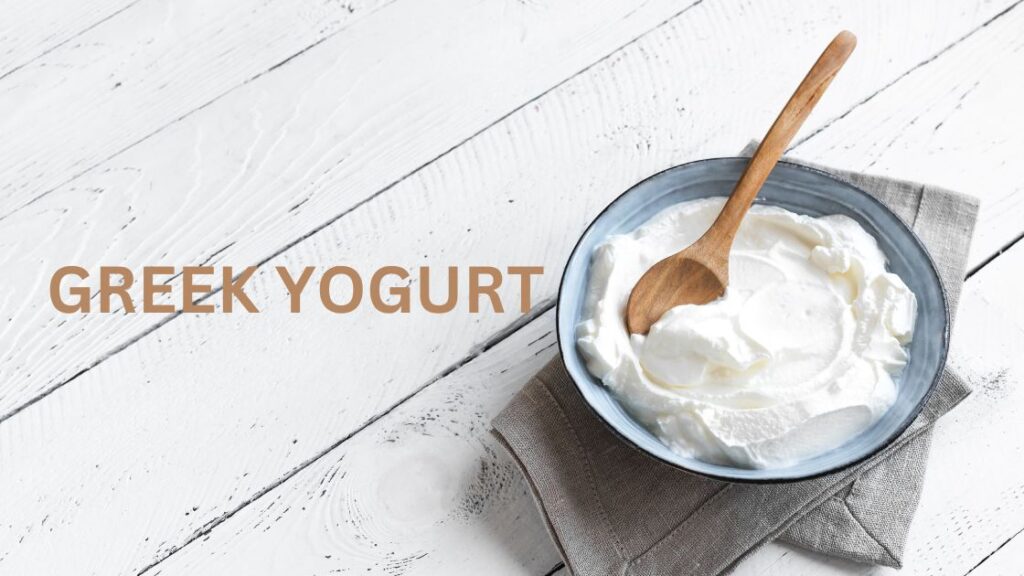
You will like this option if you want to maintain a healthy weight.
This type of yogurt has less sugar and lactose than normal yogurt because it has been treated differently.
This yogurt is suitable for people who consume low-carbohydrate foods or have lactose sensitivity.
It can easily be used in place of some snacks or normal yogurt variants. It also provides a substantial amount of protein and nutrients.
Greek yogurt includes up to 10 grams of protein every 3.5 ounces (100 grams). This is up to twice as much as the same amount of conventional yogurt.
5. Increase your protein intake
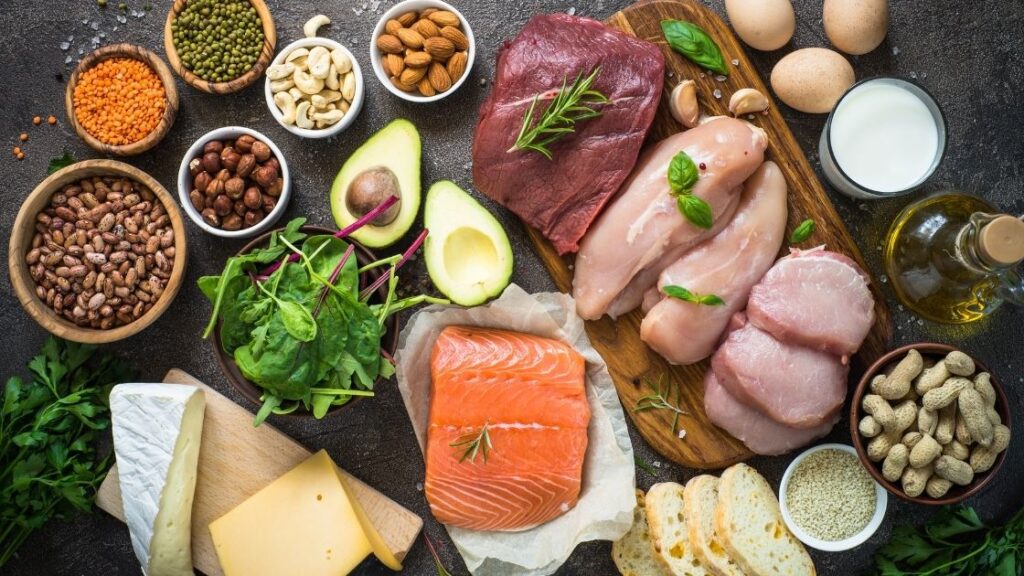
Protein helps maintain muscle mass and can modestly improve daily calorie expenditure.
Additionally, it is crucial to prevent the loss of muscle mass that can occur with weight loss and aging.
Given its capacity to affect hunger and satiety hormones, it is thought to be the most satiating of the macronutrients.
The top sources of protein include
- Dairy goods
- Peanut butter
- Almonds
- Eggs
- Beans
- Lean meat
6. Eat eggs, preferably in the morning
In studies comparing different breakfast alternatives’ combined caloric content, eggs come out on top.
Eggs are one of the best options for a healthy breakfast option.
They are abundant in high-quality protein and numerous necessary elements.
They have choline, an essential nutrient in the formation and functioning of the nervous system.
When you eat eggs in the morning, you feel fuller longer.
Consumers who eat eggs for breakfast eat fewer calories at subsequent meals.
So it’s perfect to eat them if you want to lose weight.
7. Bake or roast rather than grill or fry
The manner you cook has a big impact on how your food affects your health.
Grilling, roasting, and frying are the most widely used methods for preparing meat and fish.
However, these methods are frequently inadequate.
Following are a few healthier cooking methods:
- Baking
- Pressure cooking
- Poaching
- Broiling
- Simmering
- Stewing
- Slow cooking
These techniques could improve the quality of your food and prevent the production of hazardous substances.
8. Drink a lot of water

We must drink enough water to keep our bodies hydrated and in good health.
Drinking water can help in losing weight and may even slightly increase daily calorie expenditure.
If you drink some water before meals can decrease hunger and food consumption at the subsequent meal.
Regular consumption of water can also improve the quality of the diet and reduce caloric intake from beverages.
9. Switch to a different fast-food restaurant
When dining out, it’s not necessary to order unhealthy food.
Consider switching to a fast-food restaurant that offers more nutritious options.
There are several healthful fast-food restaurants and fusion restaurants that serve wholesome meals.
They might be a great replacement for your go-to pizza place or burger business.
Additionally, these meals are frequently quite inexpensively priced.
10. Take omega-3 and vitamin D pills

Vitamin D, a fat-soluble vitamin, is crucial for strong bones and a functioning immune system.
Every cell in our body has receptors for vitamin D, demonstrating how crucial it is.
There aren’t many foods that contain vitamin D, but fatty fish often has the highest levels.
Omega-3 fatty acids, which are found in fatty fish, are another frequently lacking nutrient.
These carry out a number of crucial bodily tasks, including
- Reduce inflammation
- Protect heart health
- Promoting healthy brain function
If you don’t frequently consume fatty fish, you might want to consider taking a supplement.
Vitamin D and omega-3 fatty acids are frequently seen together in supplements.
11. Avoid French fries and instead roasted potatoes
Potatoes are a typical accompaniment to many meals and they are incredibly delicious.
However, how they are cooked largely determines their impact on health.
For starters, 100 grams of baked potatoes have 93 calories, compared to 333 calories in the same amount of french fries.
Also, dangerous substances like aldehydes and trans fats are commonly found in fried foods like french fries.
You can avoid these dangerous elements by substituting baked or boiled potatoes for french fries.
12. Each week, experiment with at least one new healthy recipe
Most are; you’ve been preparing the same meals mechanically for years.
In order to add diversity to your diet in an enjoyable way, improve your meals.
Try to cook a new healthy recipe at least once per week.
Your nutritional and nutrient consumption may change as a result, and you may include some new, healthy foods into your regular diet.
Alternately, experiment with adding fresh ingredients, herbs, and spices to your favorite dishes to make them healthier.
13. Don’t drink your fruits; instead, eat them

Water, fiber, antioxidants, and vitamins are all abundant in fruits and vegetables.
That is why they should be included in any diet.
Studies have frequently shown a link between eating fruit and reduce your risk to a number of diseases.
Some of them are cancer, type 2 diabetes, and heart disease.
The natural sugars in fruits are normally absorbed very slowly.
In addition, they do not cause significant increases in blood sugar levels since they contain fiber and various plant components.
Numerous fruit juices are made with sugar and concentrate rather than fresh fruit.
Some varieties may even contain the same quantity of sugar as a sweet soda.
Fruit juices, even those made from real fruit, lack the fiber and chewiness of entire fruits.
Understanding this, it is better to consume the fruits directly than in juices.
14. Start with your greens
Enjoying your greens at the beginning of each meal is a great way to ensure that you consume them.
If you do it this way, you’ll likely eat all your veggies and fill up faster.
As a result, you may eat fewer post-meal foods that may be less healthy.
Eating fewer calories from healthier foods may help you lose weight.
Additionally, eating greens before a carbohydrate-rich meal has been shown to lower blood sugar levels.
15. Increase your activity level
Exercise and healthy eating go hand in hand to obtain good results in weight and disease control.
Exercise has been shown to elevate mood and reduce stress, anxiety, and depressive symptoms.
Also, it can offer benefits in many ways:
- Helps build stronger muscles and bones.
- Improve energy levels while losing weight.
- Less likely to develop chronic disorders.
- A better night’s sleep.

Try to get 30 minutes of moderate to vigorous exercise every day.
Another simple way to get active is to take the stairs and take short walks.
16. Make more meals at home
Be sure to cook dinner most times instead of eating out.
If you create your own meals, you will always be aware of every ingredient.
By preparing your own food, you won’t have to wonder if the ingredients are healthy or not.
Cooking at home has been linked to a lower incidence of obesity and a better diet, especially in children.
So this tip should be one of the main ones to consider.
17. Steer clear of “diet” foods
Dietary foods can be very challenging.
They are usually marked “fat-free,” “low-fat,” “reduced-fat,” or “low-calorie.”
Sugar and other substances are often added to offset flavor and texture by removing saturated fat.
Therefore, many of these products end up having more sugar and sometimes even more calories than regular foods.
18. Switch to sparkling water instead of sugary drinks
The least healthy thing to drink could be sugary drinks.
They contain a large amount of added sugar, which has been associated with various diseases, including
- Obesity
- Heart disease
- Type 2 diabetes
Also, the added sugar in these drinks doesn’t suppress your hunger like regular food does.
This means that you will feel just as hungry and end up consuming more calories than you should.
Try substituting your sweet drink for a sugar-free alternative, or just choose still or sparkling water.
You’ll reduce your intake of harmful calories and added sugar by doing this.
19. Choose fresh berries over dried ones
Berries are incredibly nutritious and full of fiber, antioxidants, and minerals.
Most types can be purchased dried, frozen, or fresh.
All forms are generally nutritious, but the dried versions provide a much more concentrated source of calories and sugar.
3.5 ounces (100 grams) of fresh or frozen strawberries have 31 to 35 calories per serving.
But the same amount of dried strawberries has 375 calories per serving.
Also, dry versions are often dusted with sugar, adding more sugar content than they already have.
You can get a much juicier snack with less sugar and calories if you choose the fresh varieties.
20. Get a good night’s sleep

Poor sleep interferes with appetite control, leading to increased hunger, increased calorie intake, and weight gain.
In fact, people who don’t get enough sleep tend to weigh much more than those who do.
Lack of rest also has an adverse impact on immune system performance, productivity, athleticism, and attention span.
In addition, it increases the risk of developing a number of diseases, such as inflammatory problems and heart disease.
21. Opt for healthful oils
In recent decades, highly processed vegetable and seed oils have proliferated in homes.
Canola, soybean, cottonseed, and sunflower oils are some examples.
These oils are heavy in omega-6 fatty acids but low in omega-3 fatty acids, which are good for the heart.
A high omega-6 to omega-3 ratio could cause inflammation and has been associated with chronic diseases such as:
- Osteoporosis
- Cancer
- Heart diseases
- Autoimmune disorders
Swap out these oils for wholesome ones like
- Extra virgin olive oil
- Coconut oil
- Avocado oil
22. Opt for popcorn rather than chips
It may surprise you that popcorn is a whole grain rich in fiber and minerals.
Consuming whole grains has been linked to health benefits, including decreased heart disease and inflammation risk.
Popcorn made by many commercial brands with salt, sugar, and fat is not healthy at all.
You better make your popcorn at home.
23. Place the salad dressing on a separate plate
Simply being able to place a salad order at a restaurant is regarded as a major accomplishment by many people.
Salads range in terms of how healthy they are, though.
Some salads are drenched in calorie-dense dressings, which may increase their calorie content.
If you request the dressing on the side, it will be much easier to control your calorie intake and portion size.
24. Utilize smaller plates
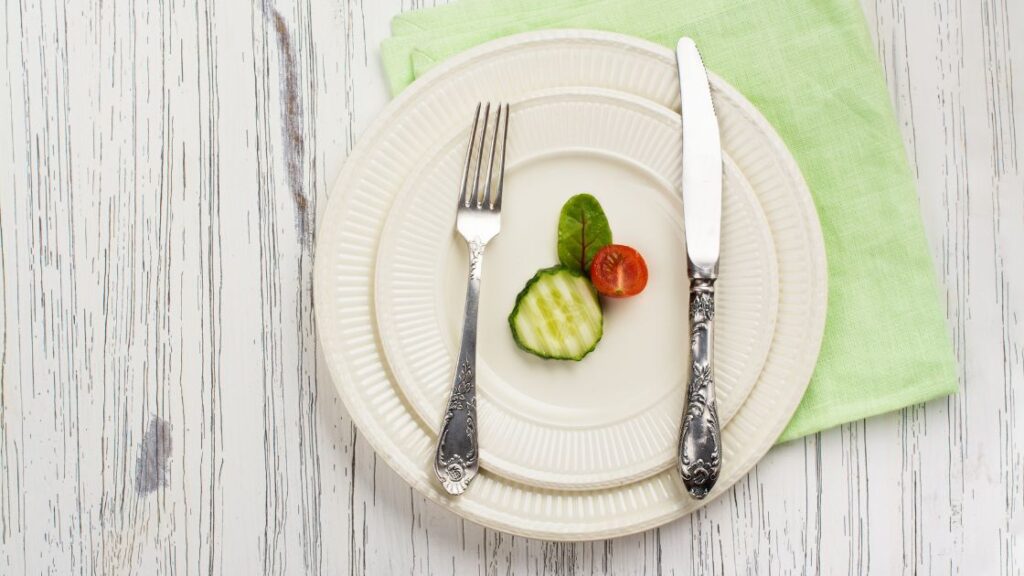
It has been proven that the size of your dinnerware affects how much food you eat.
If you use a large plate, a portion can look smaller, and a tiny plate might look bigger.
By tricking your brain into thinking you are eating more by utilizing smaller plates, you can avoid overeating.
25. Have a black cup of coffee
Coffee is one of the most popular drinks globally and is very healthy.
In fact, it is a significant source of antioxidants and has been linked to many health benefits such as:
- Lower risk of type 2 diabetes
- Avoid mental decline
- Reduced chances of suffering from liver diseases.
Many commercial varieties of coffee contain many additional ingredients, such as:
- Sugar
- Syrup
- Heavy cream
- Sweeteners
Drinking these varieties quickly negates all of the health benefits of coffee.
Instead, it adds a lot of extra sugar and calories.
Try drinking your coffee plain or add a small amount of milk or cream instead of sugar.
Are you ready?
You have 25 valuable tips for healthy eating, so start building your shopping list now. Think as Errick McAdams says:
If you keep good food in your fridge, you will eat good food.
Start Healthy Eating Now
Starting a healthy diet can help you increase your motivation.
So go ahead now and don’t leave it for later.
It is never early or late to start.
But it’s better to start earlier than after you get sick.
Think about your health, your well-being, and above all, your peace of mind.

I am a professional health and nutrition writer with extensive experience in the industry. My passion for sharing valuable insights on nutrition and wellness stems from over 15 years of personal training and maintaining a healthy lifestyle. My commitment to continuously educate myself on the latest trends and research in the field allows me to deliver high-quality content that is informative and engaging. My mission is to empower individuals to make informed decisions about their health and well-being through my writing.
